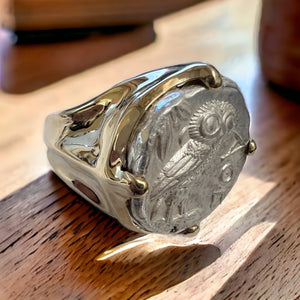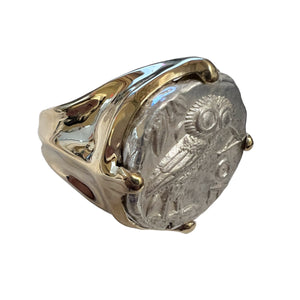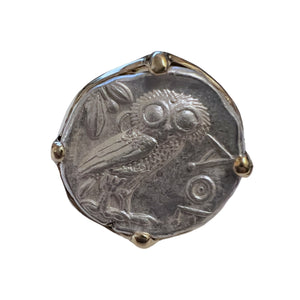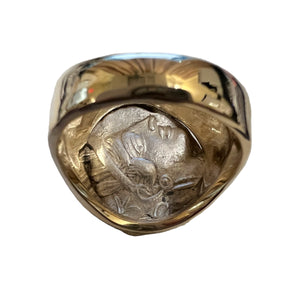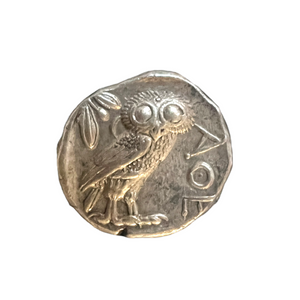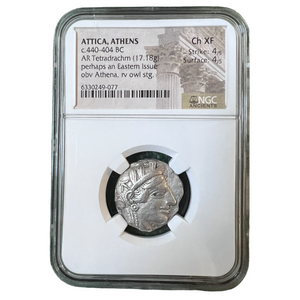Ancient Greece - AR Tetradrachm - Athena and Owl - Circa (440-404 BC)
$5,500
Uncover your daring side and journey to a time of mythical gods with this Ancient Greek tetradrachm. Featuring Athena and the mighty owl of Athens, this unique coin is perfect for the history enthusiast!
Denomination: AR Tetradrachm
Mint: Greece
Date: Circa (440-404 BC)
Weight: 17.18 g
Grade: NGC – 6330249-077 – Choice XF – Strike 4/5- Surface 4/5
Description: ATTICA. Athens. Obverse: Head of Athena right, wearing earring, necklace, and crested Attic helmet ornamented with three laurel leaves and vine scroll. Reverse: Inscription Greek (AΘE), Owl standing right, head facing; olive sprig with two leaves and one berry, and crescent moon behind, all within incuse square.
History: Athena was one of the most important goddesses in Greek mythology. She sprang full-grown and armored from the forehead of the god Zeus and was his favorite child. The Parthenon, in Athens, became hers because of her gift of the olive tree to the Athenian people. A sprig of the tree appears on her coin.
Athena was primarily the goddess of the Greek cities, of industry and the arts, and, in later mythology, of wisdom; she was also goddess of war, a patron of the agricultural arts and of the crafts of women, especially spinning and weaving, among her gifts to man were the inventions of the plow and the flute. The arts of taming animals, building ships, and making shoes are included in her attributes, and she was often associated with birds, specifically the owl. She was a virgin goddess and is always represented fully clothed, usually in armor and often holding a spear. The Tetradrachm or drachma of Athens shows many of her attributes. On the obverse one sees her head wearing a military helmet symbolizing her warrior aspect as protector of the city. On the reverse is her sacred bird, the owl, symbolizing wisdom and above, to the left, is an olive sprig symbolizing her agricultural duties. Just behind the owl's back is a small crescent moon, supporting the idea that she may have originated as a lunar goddess. In Athens, owls represented a force of mystery, but one associated with good. In many ancient cultures, owning or carrying a piece of an owl as a charm was thought to provide special protection from evil spirits and health problems. Other ancient cultures believed that energy, wisdom, and bravery might be imparted to the carrier of owl charms.
60357







